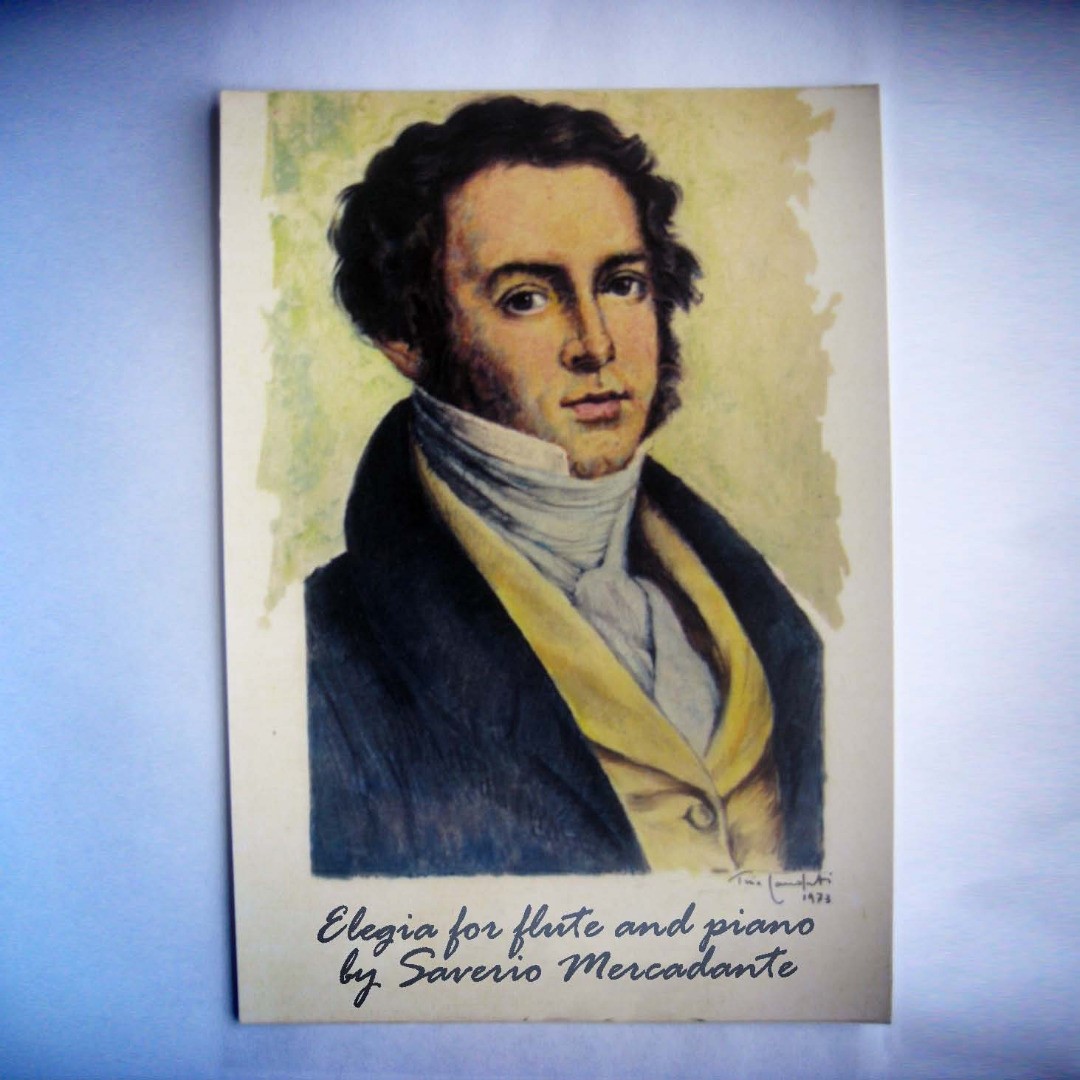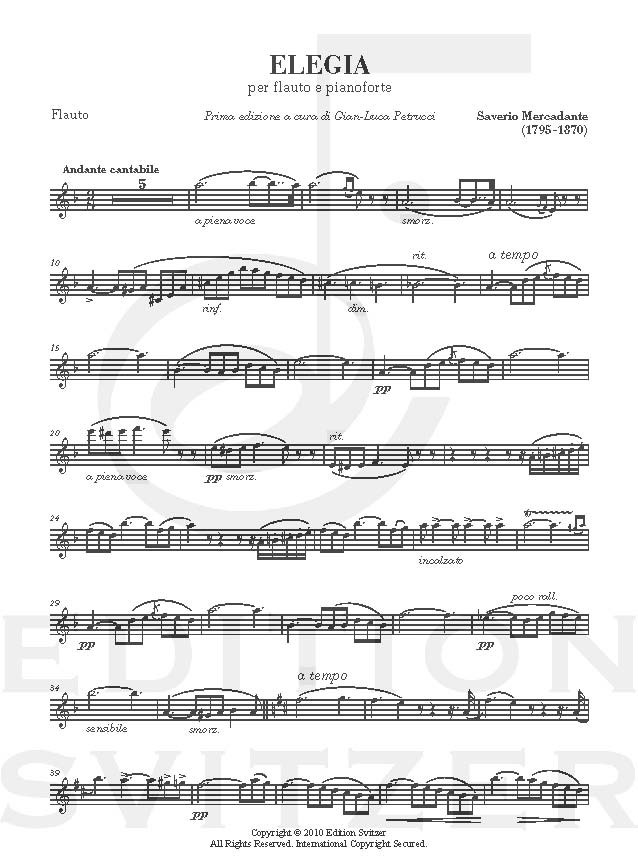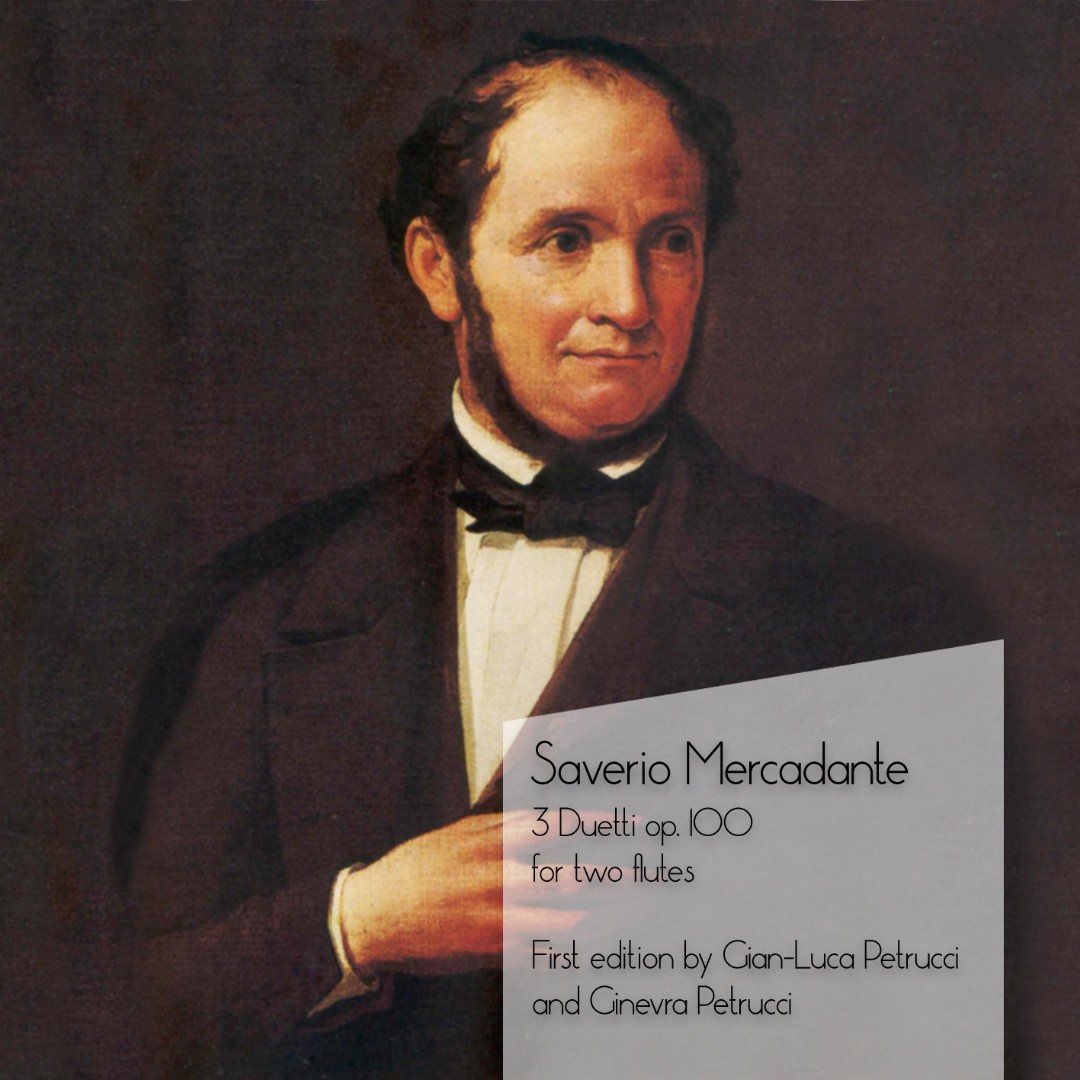
Elegia
Composer: Saverio Mercadante
Instrument: Flute and Piano
Level: Intermediate
Published: 2010
Price: €12.00
Item details
-
Description +
-
Duration: 4:30 min.
-
-
Instrumentation +
-
Flute and Piano
-
-
About the composer +
-
Saverio Mercadante was born and baptised at Altamura (in Puglia, southern Italy) on 17 September 1795. His mother, Rosa Bia, daughter of a miller, was never actually married to Giuseppe Orazio Mercadante, the owner of a mill on the ground floor of young Saverio’s first home. Indeed, research has suggested that Rosa Bia had had an affair with a local archdeacon, Nicola Leone (“distinguished musician and composer”), and that when her pregnancy became known she had resolved the unfortunate situation - with the help of the distinguished economist and chronicler Archdeacon Luigi De Samuele Cagnazzi - by attaching herself to, and becoming the servant of, Giuseppe Orazio Mercadante, who in return conceded a recognition of paternity (which, however he officially granted only in 1808 when it was needed for Saverio’s enrolment at the conservatory).
Saverio was introduced to the rudiments of music by his step-brother, but he made such rapid progress that it became clear that an adequate musical training could only be had in Naples. In 1808 he arrived in the capital to gain admission to the Conservatorio (the Collegio di S. Sebastiano); as he always already over the age limit and not a Neapolitan, he lied about his first name, date and place of birth. This has unfortunately resulted in the fact that many textbooks still give report that he was born in Naples in 1797 or 1798; and even the commemorative statue set up in Neapolitan square in 1876 perpetuates the error that his first name was Francesco (giving Giuseppe and Giacinto as the following ones). There is also, however, a different version of this episode, which attributes Mercadante’s admission to the Collegio to the direct intervention of Gioacchino Murat, Napoleon’s famous general and brother-in-law (he had married Napoleon’s sister Caroline). According to this story, Murat had heard and granted the petition presented by Saverio’s mother on 6 September 1808, the very day of his entry into Naples as its new king.
At the Collegio Mercadante studied solfeggio, violin and flute, as well as composition with Furno, Tritto and Zingarelli. After composing a number of marches and other short pieces for wind band, in 1817 he was appointed to conduct the Collegio’s orchestra, for which he wrote a series of works. It was probably during one of these academies that Rossini, on visit to the Collegio, was so impressed by Mercadante that he later wrote the following famous comment to Zingarelli: “I congratulate you heartily: your young pupil Mercadante is beginning where we leave off”. Until the age of 23 Mercadante’s interest lay mainly in instrumental music - a rare occurrence for an Italian composer of the day. The works of these years include duets, trios, quartets, concertos for flute or other instruments and sinfonie concertanti for wind instruments.
In 1819, undoubtedly with the support of Rossini, the then musical director of the Teatro S. Carlo, Mercadante was commissioned to write his first opera, L’apoteosi di Ercole. After the work’s enthusiastic reception his fame spread rapidly throughout Italy until his first genuinely significant triumph came with this seventh opera, Elisa e Claudio, staged at La Scala in 1821. This work instantly made him a European celebrity and the Italia Opera of Madrid offered him a contract to write two operas a year for a period of seven years. In those years Liszt wrote: «Ses operas sont-ils sans comparaison les plus correctes et les mieux instrumentées de tous ceux que j’ai entendu […] Les dernières ouvrages de Mercadante sont sans contredit les mieux pensées du répertoire actuel» - an opinion that eloquently reflects the consideration of the leading musicians of the age. At the beginning of 1833 Mercadante was asked to succeed Pietro Generali as maestro di cappella at the Cathedral of Novara, a position he kept for seven years and which enabled him to write a considerable amount of liturgical music, while in no way interrupting his operatic career. In 1835 Rossini invited him to Paris to write an opera for the Théâtre-Italien and, in 1839, offered him the post of director of the Liceo Musicale of Bologna (choosing him in preference to both Donizetti and Pacini). After initially accepting the position Mercadante turned it down a few months later when he was invited to succeed his teacher Zingarelli as the head of the Neaples Conservatorio, then the most important and prestigious of Europe. He assumed the directorship in October 1840 and kept it till his death thirty years later. He continued to write operas, but over the years his output declined - due surely not only to his duties at the conservatory, but also to his increasing interest in instrumental music, church music and teaching. By the date, however, he had already become a venerable figure in both the Italian and European musical scene. Though completely blind by the middle of 1862, he continued to compose until his death in Naples on 17 December 1870. Just over a month earlier, on 11 November, he had dictated his last composition to one of his devoted pupils. It was a Serenata for cello and piano, a work that testifies to his tireless melodic expression.
-
-
Credits +
-
Foreword: Gian-Luca Petrucci
Front Cover graphics and layout: Ronni Kot Wenzell
Engraving: Gian-Luca Petrucci/Johan Svitzer
Printed in Copenhagen, Denmark
Copyright © Edition SVITZER
www.editionsvitzer.com
-


